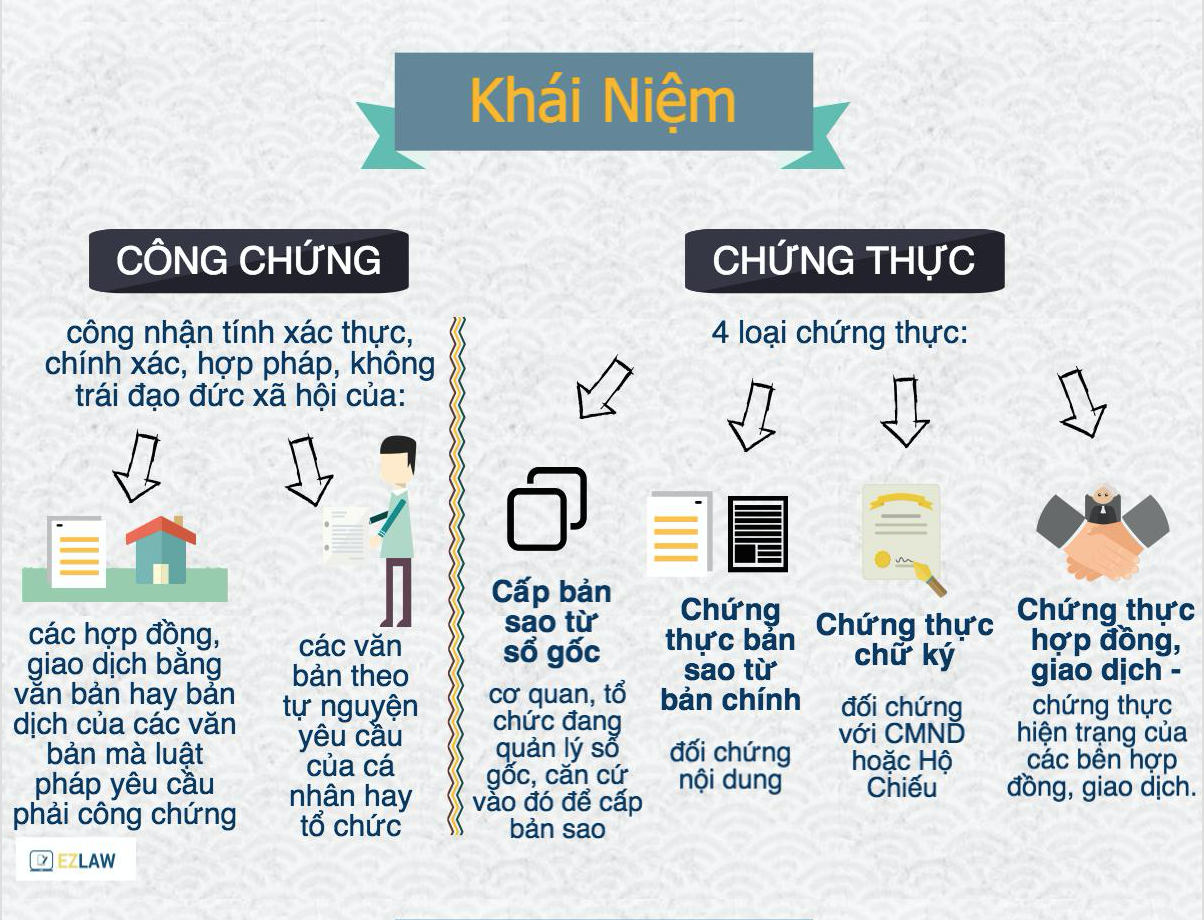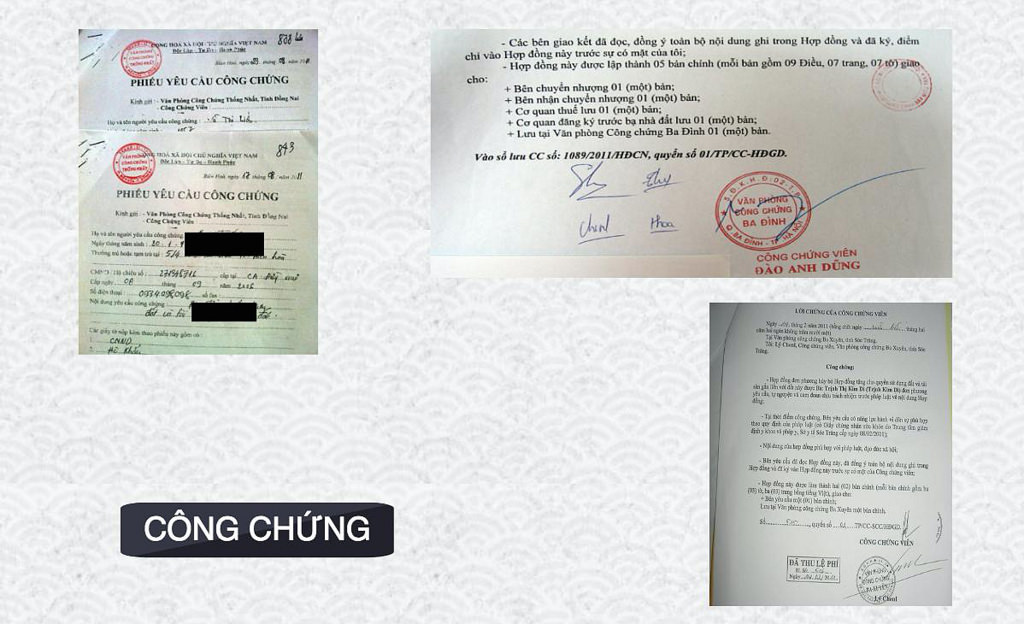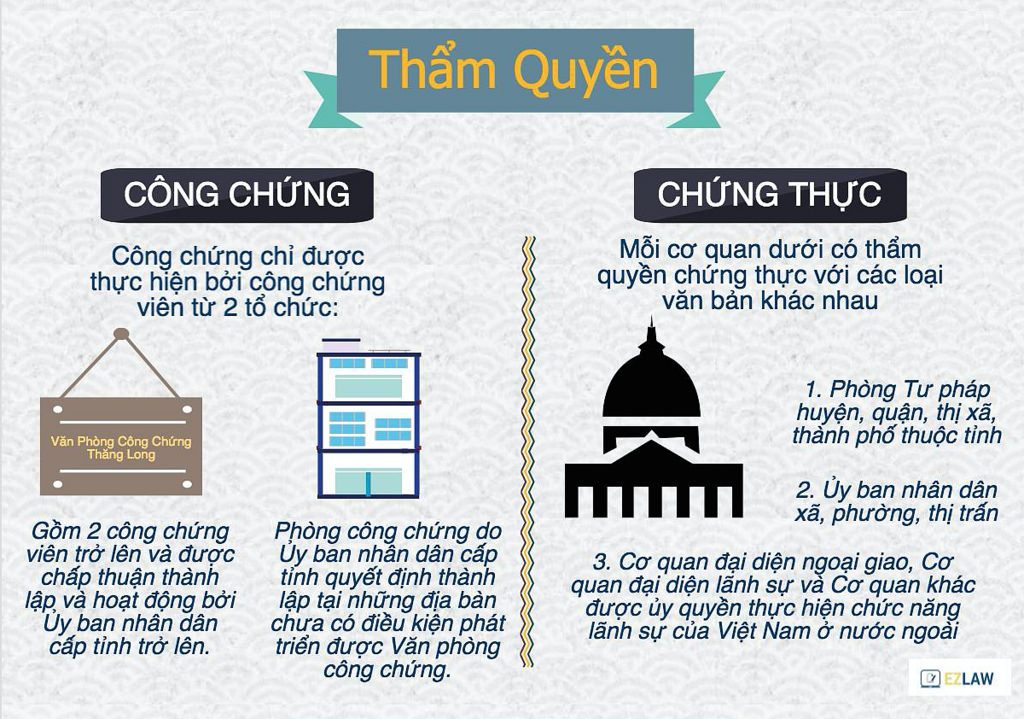Differences Between Notarization and Authentication
Although the concepts of notarization and authentication are very common and present in most areas of life, there are still many who have questions about the fundamental differences between these two forms. Notably, the current information available online has not updated the latest changes regarding the regulations for these two forms. The Law on Notarization 2014 and Decree 23/2015/ND-CP on the issuance of copies from original registers, authentication of copies from originals, authentication of signatures, and authentication of contracts and transactions, both came into effect from January 2015.
Concept

Notarization is the certification of the authenticity, legality, and non-contradiction with societal ethics of documents required by law to be notarized, or voluntarily requested by individuals/organizations, including documents translated from Vietnamese into foreign languages or vice versa.
Notarization must be performed by a notary who meets the standards stipulated by this Law and is appointed to practice.
Article 8, Law on Notarization No. 53/2014/QH13
Note: Translations of notarized documents must be performed by collaborators of notary offices to ensure the legality and accuracy of the notarized content.
Certification is the action of an authorized agency to certify a copy as true to the original, or to certify signatures on papers and documents as those of the person requesting certification. There are four types of certification:
- Issuance of copies from original registers- Certification of copies from originals- Certification of signatures- Certification of contracts and transactions
Types of Documents
Notarization:
Contracts and transactions related to real estate such as land transfer, house sale or lease are legal documents required to be notarized to be legally recognized.

Certification:
Documents not listed in the list of prohibited documents in Article 22 of the Decree can be certified as true copies. For signature certification, the ID card and Passport with signatures presented must be genuine, and the document must not fall into the category of prohibited documents (Clause 4 Article 22 and Clause 4 Article 25).

Authority

Notarization: There are two forms
The Notary Office established by the Provincial People's Committee is a public service provider under the Department of Justice, with its own office, seal, and account. The legal representative is the Head of the office, who must be a notary and is appointed, dismissed, or removed by the Chairman of the Provincial People's Committee.
The Notary Office established by a notary is organized and operates as a private enterprise. The Notary Office established by two or more notaries is organized and operates as a partnership company.
Certification: Article 5, Decree 23/2015/ND-CP
The Justice Division of district-level towns, districts, provincial cities can certify:
- Copies from originals of documents issued by competent authorities of Vietnam and abroad,- Signatures on papers, documents, or the translator's signature in those documents;- Contracts and transactions related to movable property/estate.
The People's Committee of communes, wards, commune-level towns can certify:
- Copies from originals of documents in Vietnamese or issued/certified by competent authorities of Vietnam,- Signatures on papers, documents in Vietnamese (signatures of translators cannot be certified),- Contracts and transactions related to movable property/land use rights/house-related transactions/wills.
Vietnam's diplomatic missions and consular offices abroad can certify:
- Copies from originals of documents in Vietnamese and foreign languages,- Signatures on papers, documents in Vietnamese or foreign languages;- Translator's signatures in translations.
In addition, notaries can also certify copies from originals, and signatures, with authority equivalent to the Justice Division, except that the notarization of translations must be conducted according to the provisions of the Law on Notarization.
Note: The authority to certify copies from originals and signatures does not depend on the residence of the person requesting certification.
Legal Value
Through the above information, we see that notarization ensures the content of a contract, a transaction - the notary is responsible for the legality of that contract or transaction and to guarantee legality to minimize risk. Certification, on the other hand, is only for copies, for signatures on the requester's papers, or certification of events, and the certifier does not address the content.
Notarization of contracts and transactions is performed by judicial support agencies (specifically: Notary Offices and Notary Public Offices). Certification of copies from originals and signatures is performed by state administrative agencies (commune-level People's Committees, district-level Justice Divisions).
Source: dichthuatpro.com
- Number of deputy directors of departments in Vietnam in accordance with Decree 45/2025/ND-CP
- Cases ineligible for pardon in Vietnam in 2025
- Decree 50/2025 amending Decree 151/2017 on the management of public assets in Vietnam
- Circular 07/2025 amending Circular 02/2022 on the Law on Environmental Protection in Vietnam
- Adjustment to the organizational structure of the Ministry of Health of Vietnam: Certain agencies are no longer listed in the organizational structure
- Vietnam aims to welcome 22-23 million international tourists in Vietnam in 2025
-

- Notable new policies of Vietnam effective as of ...
- 16:26, 11/04/2025
-
.Medium.png)
- Notable documents of Vietnam in the previous week ...
- 16:21, 11/04/2025
-
.Medium.png)
- Notable documents of Vietnam in the previous week ...
- 16:11, 02/04/2025
-
.Medium.png)
- Notable new policies of Vietnam to be effective ...
- 16:04, 02/04/2025
-
.Medium.png)
- Notable new policies of Vietnam effective from ...
- 14:51, 21/03/2025
 Article table of contents
Article table of contents
